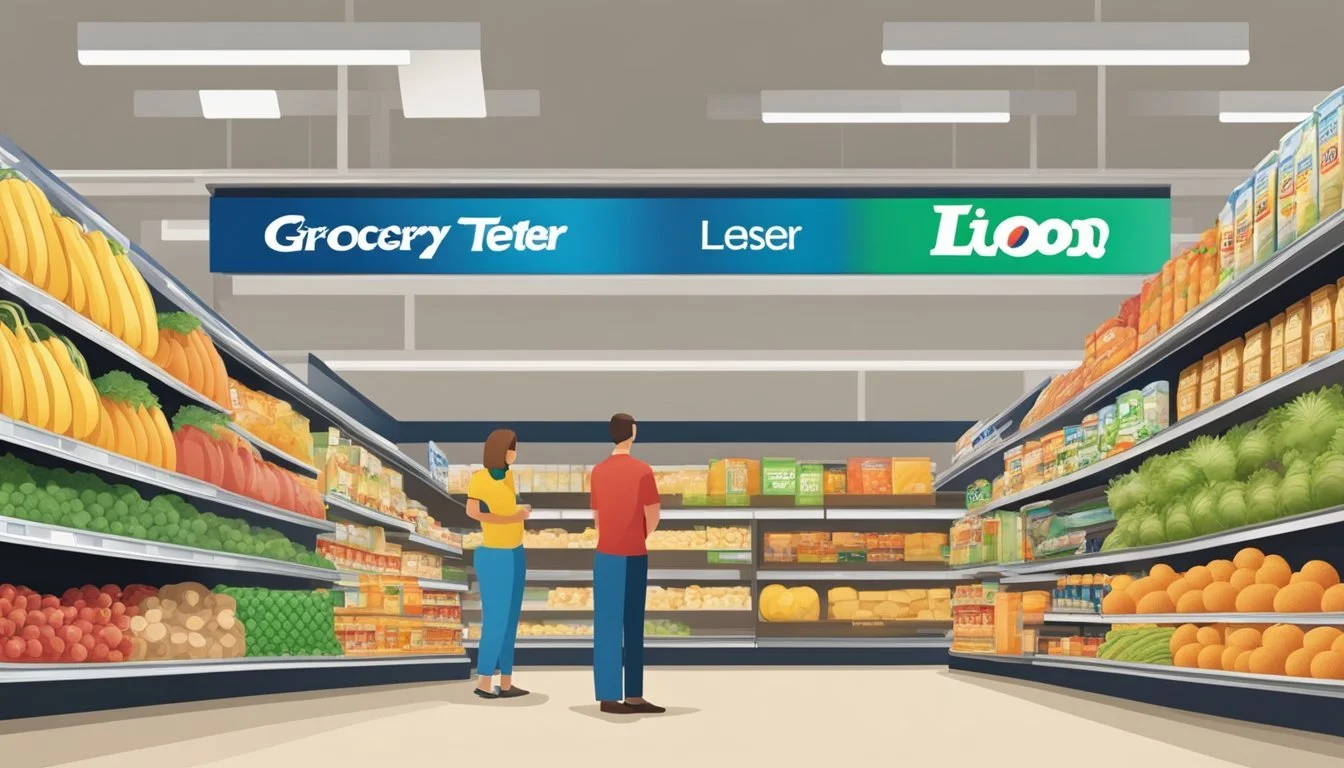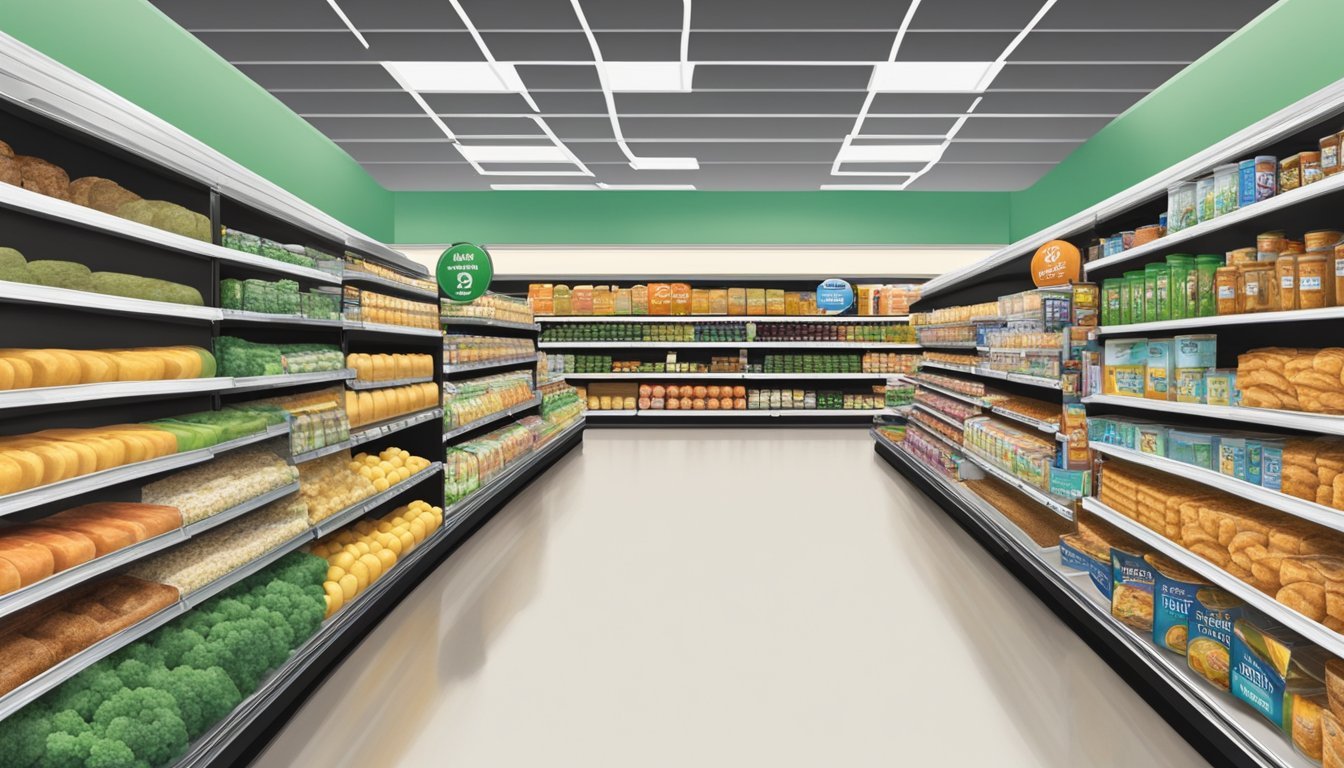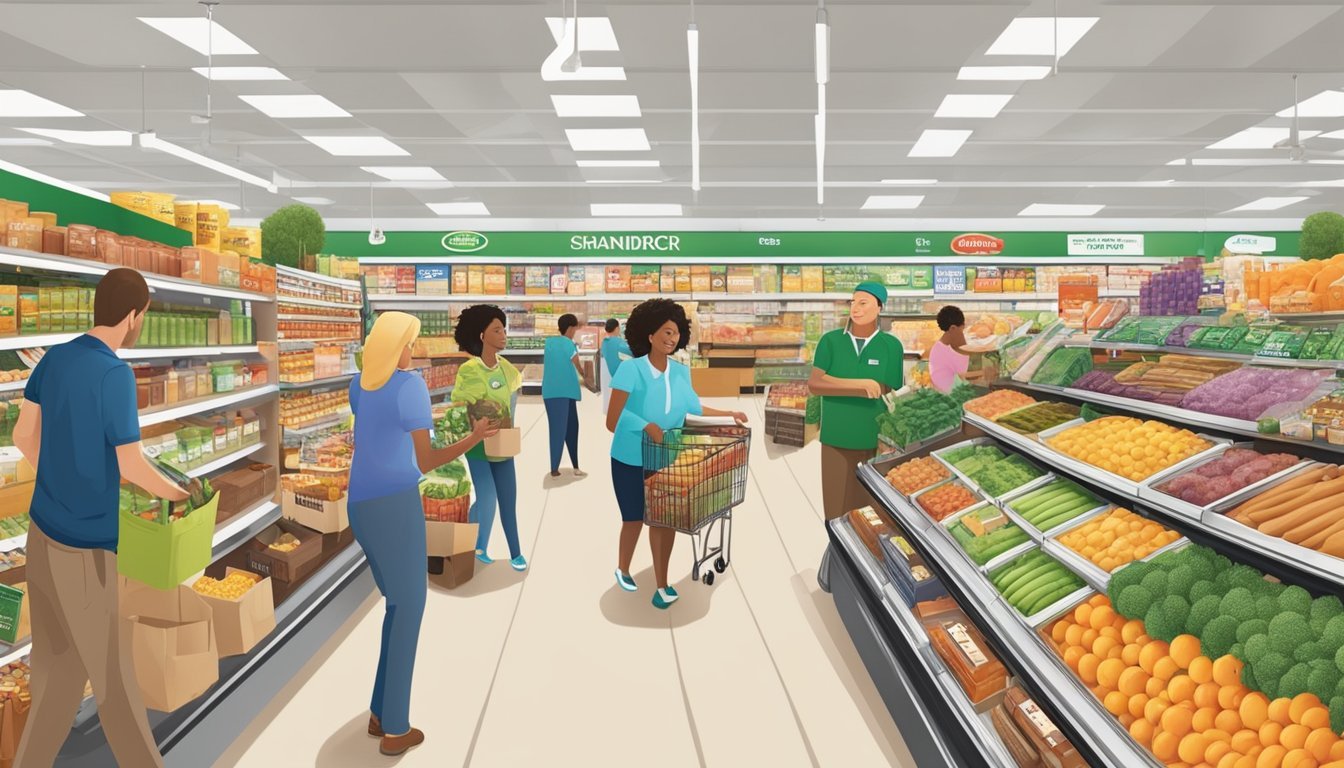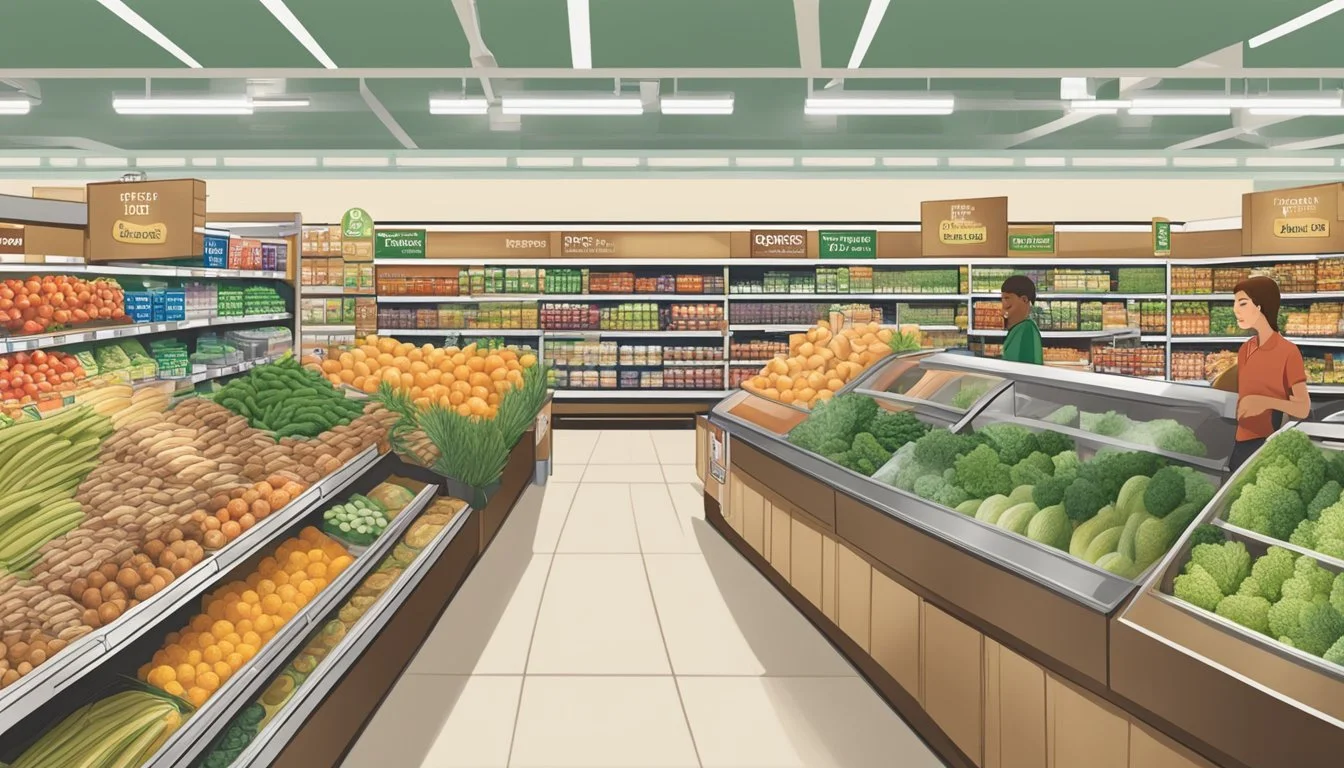Harris Teeter vs Food Lion
Comparing Quality, Prices, and Services
Part of Our Grocery Store Guide with Details on Harris Teeter and Food Lion
When comparing grocery stores for quality and value, Harris Teeter and Food Lion often come into the conversation. Each chain has its own strengths, appealing to different customer preferences and shopping habits. Harris Teeter, as a subsidiary of Kroger Co., operates over 3,200 stores and is known for its quality produce and meat selections. On the other hand, Food Lion, with just over 1,000 stores across ten states, positions itself as a competitively priced grocery option.
Price is a critical factor for many shoppers, and Food Lion has been noted to be more affordable in various categories, with savings ranging from 5% to 33% compared to Harris Teeter. However, Harris Teeter is often considered a higher-end store, potentially offering a better shopping experience and a broader range of organic products. Both stores aim to cater to their target demographic by balancing cost and quality, but the preferences for either will depend on individual budget constraints and the importance of organic and specialty offerings.
Determining which store is superior is not a straightforward task as it involves analyzing product variety, store brand quality, customer service, and overall shopping experience. While Food Lion may lead in affordability, Harris Teeter's association with the largest grocery store operator in the US may give it an edge in product variety and quality, especially for fresh foods. Consumers' choice between the two might ultimately come down to a trade-off between these factors.
Historical Background
Harris Teeter and Food Lion are both popular supermarket chains primarily located in the southeastern United States, each with a robust history.
Harris Teeter traces its origins back to the 1930s. In 1936, W.T. Harris founded his first grocery store in Charlotte, North Carolina. A separate venture, led by Willis L. Teeter and his brother, Paul, saw the opening of their own store in Mooresville, North Carolina in 1939. These two businesses merged in 1960 to form the Harris Teeter supermarket chain, which has since grown to become a well-known name in the grocery industry.
Establishment: 1930s
Original Founders: W.T. Harris, Willis L. Teeter, and Paul Teeter
Merger: 1960
Growth: Expanded across the Southeast
On the other hand, Food Lion began its journey a bit later. Originally named Food Town when it was established in 1957 in Salisbury, North Carolina, it was a small, local establishment that gradually expanded. In 1983, Food Town renamed itself to Food Lion as it grew beyond its regional borders and to avoid conflicts with other chains named Food Town.
Original Name: Food Town
Establishment: 1957
Renaming: 1983
Expansion: Regional to broader markets
Both Harris Teeter and Food Lion have evolved over the decades, becoming staples in many communities across the southeastern regions of the United States. They stand today as two of the key players in the region's grocery sector, each with a substantial footprint in the industry.
Store Footprint and Locations
Harris Teeter and Food Lion are both prominent grocery store chains with a significant presence on the East Coast of the United States. They serve a diverse customer base and have tailored their locations to cater to the regional preferences and demand.
Harris Teeter, established in 1936, operates over 230 stores across seven states and the District of Columbia. Its stores are primarily concentrated in urban and suburban markets, with a strong presence in North Carolina, its home state. Harris Teeter's locations are known for offering a variety of services, including pharmacies and fuel centers in selected locales.
Food Lion, founded in 1957, has a broader geographic span with approximately 1,000 stores in ten states ranging from the Mid-Atlantic to the Southeastern United States. Food Lion's strategic placement often targets both metropolitan and smaller communities, providing a more extensive regional reach compared to Harris Teeter.
The following table outlines the regional distribution of each store:
Chain Number of Stores States Present Notable Regions Harris Teeter >230 NC, SC, VA, GA, FL, DE, MD, DC Charlotte, Raleigh Food Lion >1,000 NC, SC, VA, GA, FL, DE, MD, PA, TN, WV, KY, AL Greater East Coast
While Harris Teeter is seen as an upscale market player focusing on quality and customer experience, Food Lion emphasizes accessibility and convenience, which reflects in its more extensive number of stores and reach. Each chain has tailored their store locations to align with their brand image and customer expectations.
Product Range and Quality
Harris Teeter and Food Lion offer a broad range of products encompassing produce, meat, dairy, deli, and bakery items, amongst others. Customers can find a considerable selection of store brand and national brand products within these categories at both grocery stores.
When it comes to quality, Harris Teeter is often recognized for providing high-quality fresh produce including a variety of fruits and vegetables. The store has a reputation for stocking fresh and premium-quality products, particularly in its meat and deli sections. Shoppers looking for organic options may also find Harris Teeter to be well-suited to their needs, as the store tends to carry a diverse range of organic produce and goods.
On the other hand, Food Lion has a competitive product range, focusing on offering value to customers. While both stores provide frozen foods, search results indicate Harris Teeter could be the go-to for savings in the frozen food category. Nevertheless, Food Lion competes strongly on price across various other categories.
Both grocery chains possess their respective store brands, offering a cost-effective alternative to national brands without sacrificing quality. In particular, Harris Teeter’s store-brand items are designed to match the quality of national brands. Food Lion presents a similar value proposition with its store-brand products.
The bakery sections at Harris Teeter and Food Lion showcase an assortment of bread, cakes, and pastries. Quality here may vary by location, but both stores aim to provide freshly baked goods daily.
In summary, both Harris Teeter and Food Lion provide a comprehensive product range, with a focus on quality and value in different aspects of their offerings.
Pricing and Affordability
In evaluating Harris Teeter and Food Lion, a critical factor for consumers is the pricing and affordability of groceries. Each store has distinct strategies for pricing and promotions that influence overall grocery bills.
General Pricing
Harris Teeter: Known for a premium shopping experience, Harris Teeter's pricing can be higher on average. For instance:
Beverages: On average, $0.89.
Baking Goods: No specific information provided.
Food Lion: Typically provides more competitive pricing with a general saving:
Beverages: Averages at $0.69.
Baking Goods: No specific information provided.
Food Lion's prices are noted to be, in some categories, up to 33% less expensive than Harris Teeter. Therefore, for shoppers prioritizing budget, Food Lion might be the better choice.
Sales and Promotions
Both Harris Teeter and Food Lion engage customers with sales and promotions that can drastically reduce the week-to-week grocery bills:
Harris Teeter: Offers competitive savings in the frozen foods category, with average savings of about $0.30.
Food Lion: Provides promotions that could lead to significant savings across various categories, sometimes saving shoppers up to a third of the cost on selected items.
Shoppers should pay attention to weekly flyers and in-store promotions, as they can offer the best deals irrespective of the stores' general pricing trends.
Customer Service Experience
Harris Teeter and Food Lion offer contrasting customer service experiences tailored to their respective brands. Harris Teeter, known for its clean stores and friendly staff, stresses a more upscale shopping experience. They provide customers with personalized attention and quick response to inquiries, aiming for a positive, hassle-free visit.
In contrast, Food Lion focuses on efficiency and affordability. While its customer service is generally regarded as satisfactory, it may not match the level of personal care found at Harris Teeter. However, they ensure that customer needs are met through a systematic approach to service.
The delivery services offered by both stores accentuate their commitment to convenience. Harris Teeter's delivery integrates seamlessly with their customer service reputation, ensuring timely and accurate deliveries. On the other hand, Food Lion also offers reliable delivery options, emphasizing their dedication to meeting customer expectations.
A comparison of service features could be visualized as:
Feature Harris Teeter Food Lion Store Cleanliness High Standard Staff Friendliness Very Friendly Friendly Personalized Attention Strong Moderate Responsiveness Quick Average Delivery Timely Reliable
Both stores value customer feedback and actively work to resolve issues, whether they arise in-store or during the delivery process. Each brand has carved out its niche in customer service, choosing either to excel in a personal touch or in streamlined service and cost-effectiveness.
Brand and Store Reputation
When comparing the reputations of Harris Teeter and Food Lion, one should consider the perception of both brands and store brands within the market. Harris Teeter is a subsidiary of Kroger Co., the largest grocery store operator in the United States by revenue, which may contribute to its strong brand reputation. On the other hand, Food Lion is a grocery store chain with a wide presence in the southeastern United States, known for its commitment to affordability and convenient shopping experience.
Regarding store brands, Harris Teeter's products are often compared with national brands in terms of quality and flavor, suggesting a positive reception among consumers. Food Lion's store brand products are also recognized for providing value, with savings reported to be typically around 20% cheaper than national brands.
Consumer Surveys: A reputable factor in brand reputation is customer feedback through surveys. Although specific survey results are not detailed here, such assessments can be significant in understanding brand reputation.
Perceived Strengths and Weaknesses:
Harris Teeter might receive accolades for its fresh food selection and customer service, albeit at higher price points.
Food Lion may garner appreciation for its lower pricing, making it an appealing option for budget-conscious shoppers.
Lastly, it is important to acknowledge that both brands have faced scrutiny at times, resulting in low marks in certain categories. To maintain neutrality, precise failings are not emphasized, but generally, these might involve customer dissatisfaction in areas such as product availability or in-store experience, which both brands continually strive to improve.
Availability of Specialty Categories
When comparing the availability of specialty categories between Harris Teeter and Food Lion, one observes distinct offerings tailored to diverse consumer needs.
Harris Teeter is known for its broad selection of specialty categories. They often offer extensive varieties of gourmet and organic foods, catering to specific dietary preferences such as gluten-free, vegan, and international cuisines. Their stores frequently feature specialty sections for cosmetics and drugs, making them a convenient one-stop-shop for grocery and personal care items. Harris Teeter's commitment to variety extends to a well-maintained selection of health and wellness products.
Food Lion, while often providing a more budget-conscious assortment, also includes a range of specialties. They have made strides in expanding their organic and natural food offerings. However, their selection of cosmetics and drugs may not be as expansive as Harris Teeter's. Food Lion's focus is generally on delivering the basics at a lower cost, which may result in a less diverse specialty category lineup.
Both stores address the issue of product recalls responsibly, with dedicated customer service to handle any concerns and ensure shopper safety. They keep customers informed through in-store notices and online platforms.
Specialty Category Overview
Category Harris Teeter Food Lion Organic Foods Extensive Moderate Gourmet Foods Wide Range Limited Cosmetics Well-Stocked Basic Drugs Comprehensive Essential
Each grocery store shines in different aspects of specialty categories, with Harris Teeter leaning towards a more upscale selection, while Food Lion focuses on essential needs and affordability.
Discounts, Savings, and Loyalty Programs
When comparing Harris Teeter and Food Lion, the focus on discounts, savings, and loyalty programs provides a clearer view on which may offer the better deal for shoppers. Both grocery chains offer distinct membership benefits and savings options that cater to different customer needs.
Membership Benefits
Harris Teeter offers the e-VIC program, which stands for "Very Important Customer." This initiative tailors discounts and specials to individual shopping patterns, sending personalized weekly emails with exclusive offers. Furthermore, e-VIC members have access to special promotions and sweepstakes.
Food Lion promotes its MVP customer reward program, where customers can enjoy immediate discounts at checkout. Users can tap into personalized offers based on purchase history through Food Lion's Shop & Earn monthly rewards.
Comparison of Savings Options
Both stores offer competitive sales on various categories. Here's a brief comparison:
Store Brands:
Harris Teeter boasts access to the Kroger family of brands, often at a lower price point than national brands.
Food Lion similarly offers its own store brand products that promise comparable quality for a fraction of the national brand cost.
Savings on Sales:
Harris Teeter provides weekly sales and occasionally double coupon events, allowing customers to save more on their favorite items.
Food Lion highlights weekly deals in its sales flyer, often featuring significant savings on bulk purchases and buy-one-get-one-free deals.
In summary, both Harris Teeter and Food Lion have structured their loyalty programs and sales to create value, but the extent of the benefits may vary depending on the individual shopper’s preferences and purchasing habits.
Cleanliness and Store Layout
When evaluating the cleanliness and store layout of Harris Teeter and Food Lion, it is paramount that shoppers find stores that prioritize a clean shopping environment and an intuitive layout.
Harris Teeter stores are known for their cleanliness. They maintain high standards for store upkeep from the entrance to the checkout lanes. Shelves are typically well-organized and floors are clean, providing a comfortable shopping atmosphere.
Contrarily, Food Lion also takes cleanliness seriously, yet some customers might find variance from store to store. The layout is straightforward, making it easy for customers to find their desired products, but it may lack some of the polish seen in Harris Teeter's presentation.
Store Layout Comparison:
Aisles: Both Harris Teeter and Food Lion are structured with clear aisle markers. Harris Teeter often has wider aisles, while Food Lion's layout is more compact.
Signage: Harris Teeter excels with bold and clear signage, while Food Lion's is functional but may not catch the eye as readily.
Organization: Both stores categorize their items effectively. Harris Teeter frequently utilizes endcap displays to highlight specials, whereas Food Lion keeps a more consistent shelving structure throughout.
It's worth noting that store layout can influence the shopping experience by offering ease of navigation and reducing the time needed to find items. Maintenance and orderliness reflect the store's commitment to a pleasurable shopping journey. Customers should expect all areas, including produce, deli, and checkout lines, to be orderly and sanitary in both Harris Teeter and Food Lion.
Comparison with Competitors
When comparing Harris Teeter and Food Lion to their competitors in the grocery industry, consumers observe a variety of strengths and pricing strategies. Harris Teeter is often viewed as a more upscale choice, which results in higher prices relative to some competitors. For instance, Aldi and Lidl excel in offering highly competitive prices often deemed more affordable than Harris Teeter.
Food Lion, on the other hand, is known for having lower prices, challenging other value-centric stores such as Walmart and Kroger. In direct comparison, Food Lion's pricing can be around 5% to 33% more cost-effective than Harris Teeter across certain categories.
Regarding variety and quality, stores like Wegmans and Whole Foods Market are renowned for their extensive selections and higher-end products, which cater to a different market segment focused on premium offerings. Trader Joe's stands out with its unique branded items and a shopping experience that differs from both Harris Teeter and Food Lion.
In terms of bulk purchases, Costco and Sam's Club provide significant savings on large quantities, which neither Harris Teeter nor Food Lion emphasize as much in their business models. Locations such as Target and Amazon offer the convenience of combining grocery shopping with general merchandise, putting them in competition across different retail sectors.
Food Lion competes closely with:
Aldi
Lidl
Walmart
Kroger
Harris Teeter is often compared with:
Wegmans
Whole Foods Market
Trader Joe's
Both stores face competition from bulk retailers such as:
Costco
Sam's Club
And general retailers that also offer grocery options:
Target
Amazon
Each competitor serves distinctive customer preferences, and the choice largely depends on individual needs for price, quality, and shopping experience. Harris Teeter and Food Lion maintain their own competitive edges within this diverse market landscape.
Online Shopping and Home Delivery Options
In the digital age, grocery shopping has transcended beyond physical storefronts. Both Harris Teeter and Food Lion offer online shopping options, leveraging technology for greater convenience.
Harris Teeter provides a seamless online shopping experience through its website and smartphone app. Customers can shop for groceries online and opt for home delivery services. The store has a dedicated customer service team to ensure that the home delivery process runs smoothly. They promise freshness and punctuality with their deliveries, catering to customers who prefer their groceries delivered right to their doorstep.
Food Lion also has adopted the online shopping model, with a user-friendly interface for both their website and mobile application. Their service allows customers to browse and purchase groceries virtually. Home delivery at Food Lion is designed to be customer-oriented, prioritizing timely and accurate delivery of groceries to the customer's location.
Comparison of Home Delivery Services:
Feature Harris Teeter Food Lion Online Shopping Available on website and app Available on website and app Home Delivery Offered, with a focus on punctuality Offered, priority on accuracy and timeliness Customer Service Dedicated support for online and delivery Attentive to customers' delivery needs Smartphone Friendly User-friendly and efficient app Easy navigation through app
Both grocery store chains ensure that their online shopping and home delivery services are as efficient and convenient as possible. The choice between Harris Teeter and Food Lion may come down to personal preferences for app usability, specific product availability, or the overall customer service experience.
Sustainability and Community Involvement
Harris Teeter and Food Lion prioritize sustainability but approach it distinctively. Harris Teeter, as part of the Kroger Co, leans on its parent company's sizeable influence to make significant strides in environmental stewardship and community engagement.
Food Lion, on the other hand, has announced major sustainability commitments that focus on transparent sustainable sourcing, climate action, reducing waste, and providing healthier choices. Food Lion's sustainability measures have a profound impact on how they interact with their neighborhoods and the environment.
Key aspects of sustainability and community involvement:
Supporting Local: Both stores make concerted efforts to foster relationships with local farmers and producers, creating a pipeline of fresh, community-centric products.
Prepared Foods: Featuring store brand items, the grocery stores strive to balance quality and sustainability in their selection of prepared foods.
Waste Reduction: Emphasis is placed on minimizing waste, a staple of their pledge towards being ecologically responsible.
Harris Teeter Food Lion Sustainability Actions Kroger's Framework Independent Commitments Community Engagement Extensive Far-reaching Waste Reduction Part of General Policy Strategic Priorities
Each store's efforts contribute to a shared goal among grocers to align more closely with FDA guidelines and consumers’ rising eco-consciousness. By undertaking these initiatives, both Harris Teeter and Food Lion confirm their commitment to sustainability and community involvement, reflecting a dedication to both the planet and patron well-being.
Consumer Demographics and Target Market
Harris Teeter and Food Lion cater to diverse consumer bases, each with distinct demographics and target markets.
Harris Teeter appeals primarily to middle-to-upper income shoppers who value a combination of convenience, quality, and service. They tend to attract customers who are willing to pay a premium for a pleasant shopping experience and higher-end product selections, including organic and specialty items. Harris Teeter's customers often reside in suburban or urban neighborhoods and may include working professionals, health-conscious individuals, and families looking for quick meal solutions.
Food Lion, on the other hand, is known for its affordability which draws a broader customer base, including cost-conscious individuals and families. Their target market consists of price-sensitive consumers, often from a range of demographic backgrounds, including students, seniors, and budget-minded families. Food Lion's emphasis on value appeals to those who prioritize savings and are looking for both staple items and discounted merchandise.
Both stores have strategies in place to cater to their target demographics:
Harris Teeter:
Emphasizes clean, well-organized stores.
Offers a robust rewards program for regular shoppers.
Provides a wide array of prepared foods and in-store services.
Food Lion:
Focuses on competitive pricing and weekly deals.
Maintains a straightforward layout for easy product location.
Prioritizes quick checkout processes for convenience.
The two chains have distinctly branded themselves to attract their desired clientele, reflecting their understanding of the varying needs and preferences of different consumer groups within the grocery store market.
Final Summary and Recommendations
When choosing between Harris Teeter and Food Lion, shoppers should consider their priorities in terms of pricing, product selection, and convenience.
Pricing Comparison:
Food Lion typically offers lower prices, with average savings ranging from 5% to as much as 33% compared to Harris Teeter.
Exceptionally, Harris Teeter may have better prices on select items, such as meats and frozen goods.
Product Availability:
Shoppers seeking a wider variety of store brands might prefer Wegmans, if available.
Those valuing a large selection of private label products might find Food Lion suitable with its expansive brand line for its size.
Convenience Factors:
Harris Teeter, a part of Kroger Co., boasts a larger network of over 3,200 stores, which may be convenient for frequent shoppers.
Consumers might find Food Lion to be more accessible in certain regions, despite its smaller footprint of around 1,000 stores.
In summary, c
onsumers should base their supermarket choice on their geographical location, product preferences, and budget constraints. Harris Teeter is the go-to for higher-end selections and certain categories like meats, while Food Lion is a budget-friendly option without significant compromises on quality, especially for grocery staples. Either store could serve as a primary shopping destination, with the final decision hinging on individual needs and shopping habits.







